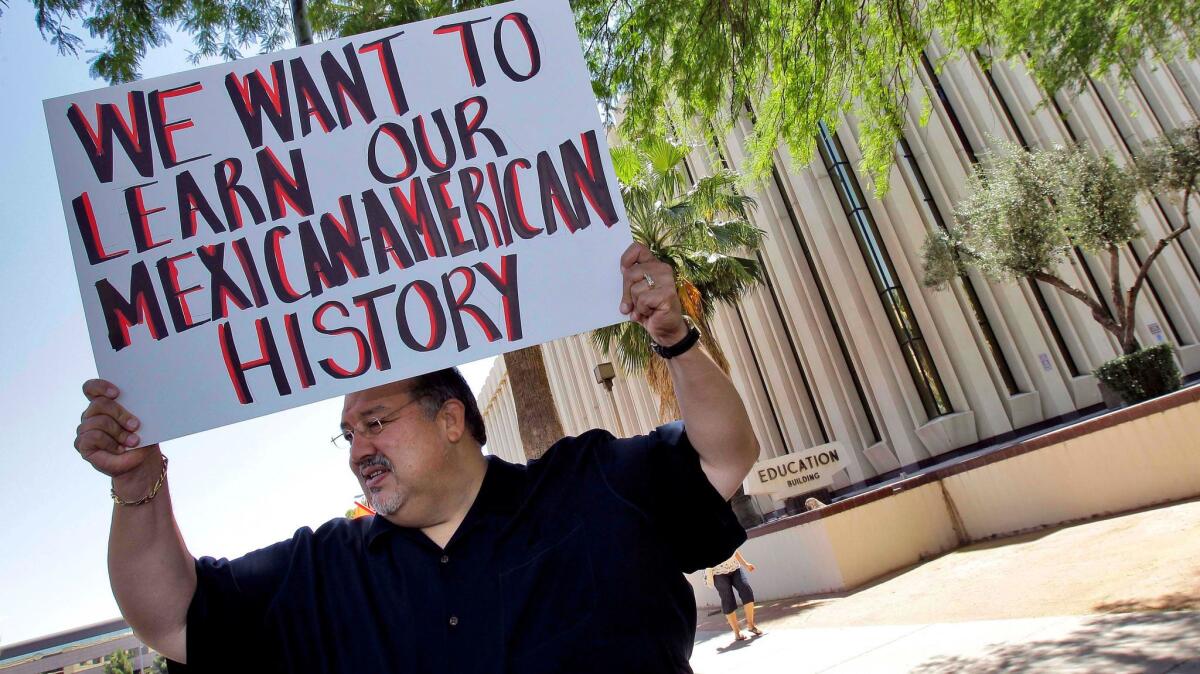Federal judge says Arizona’s ban on Mexican American studies is racially discriminatory

- Share via
A federal judge in Arizona ruled Tuesday that the state’s controversial ban on ethnic studies was motivated by racial discrimination.
The decision from Judge A. Wallace Tashima, a federal appeals court judge sitting in the district court in Arizona, came in a lawsuit brought by students against the state’s top education official. It is a major blow to a state law that resulted in the closure of a Mexican American studies program in Tucson.
Proponents of the program have argued that the 2010 law, which in part banned courses designed primarily for students of a particular ethnic group, was effectively racist and targeted Mexican Americans and other minority groups.
Tucson dropped its Mexican American studies program in 2012 under threat of losing state funding.
“Both enactment and enforcement were motivated by racial animus,” Tashima wrote in his decision Tuesday. He said that the law violated the equal protection clause of the Constitution by discriminating against Latinos. He also said the law violated students’ 1st Amendment “right to receive information and ideas.”
Arizona’s law in general banned classes promoting “resentment toward a race or class of people.”
It was all the more controversial because it was passed the same year the state passed the widely protested SB 1070 law, which required police to determine the immigration status of someone arrested or detained when there was “reasonable suspicion” they were not in the U.S. legally.
In his decision, Tashima railed against former Arizona state superintendents of public instruction who pushed to pass the ban, John Huppenthal and Tom Horne.
“Defendants were pursuing these discriminatory ends in order to make political gains. Horne and Huppenthal repeatedly pointed to their efforts against the [Mexican American studies] program in their respective 2011 political campaigns, including in speeches and radio advertisements. The issue was a political boon to the candidates,” the judge wrote.
“Both individuals conveyed an unfounded, yet uniform, distrust of … teachers’ and students’ accounts of what was taking place in [Mexican American studies] classrooms,” he wrote.
A former teacher in the Tucson program, Curtis Acosta, reacted to the ruling on Twitter.
“I just received word from our attorney, Richard Martinez, that we won our case against the state of Arizona. ¡Justicia!” he tweeted.
In an interview, Martinez said he was confident that the ruling meant the law would be dismantled. Martinez said the judge would hold a hearing in the next three weeks to determine how the ruling should be enforced.
Anita Fernandez, director of the Xicanx Institute for Teaching and Organizing in Tucson, said Tuesday that she was celebrating the decision.
“We’re very excited by the ruling, specifically that the court was convinced by testimony and evidence [that it] was racial discrimination,” Fernandez said. “Now it is up to the school district to decide what they are going to do.”
Jaweed Kaleem is The Times’ national race and justice correspondent. Follow him on Twitter, Facebook and Instagram.
ALSO
Police vow to ‘stamp out’ violence at San Francisco rally expected to draw white supremacists
103-year-old Cambodian woman becomes a U.S. citizen
More to Read
Sign up for Essential California
The most important California stories and recommendations in your inbox every morning.
You may occasionally receive promotional content from the Los Angeles Times.














